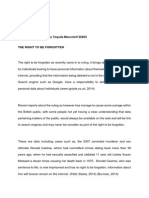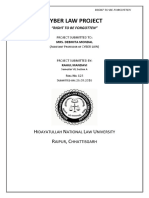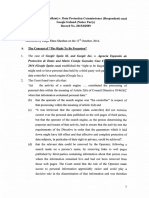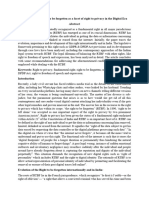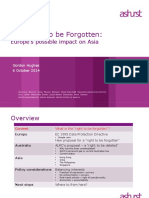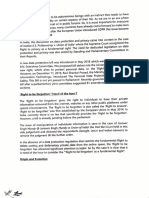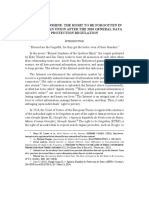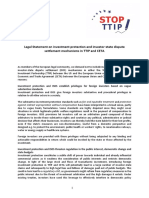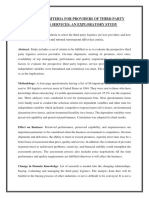1
0100110101010000100010101010101010101010
0101010101010010011010101000010001010101
01010101010101010101010100101010101010
0100110101010000100010101010101010101010
0101010101010010011010101000010001010101
01010101010101010101010100101010101010
0100110101010000100010101010101010101010
0101010101010010011010101000010001010101
01010101010100101010101010
0100110101010000100010101010101010101010
0101010101010010011010101000010001010101
01010101010100101010101010
Justice
Myth-Busting
The Court of Justice of the EU and the Right to be Forgotten
Myth 1: The judgment does nothing for citizens
Myth 2: The judgment entails the deletion of content
Myth 3: The judgment contradicts freedom of expression
Myth 4: The judgment allows for censorship
Myth 5: The judgment will change the way the internet works
Myth 6: The judgment renders the data protection reform redundant
0100110101010000100010101010101010101010
0101010101010010011010101000010001010101
01010101010101010101010100101010101010
0100110101010000100010101010101010101010
0101010101010010011010101000010001010101
01010101010101010101010100101010101010
0100110101010000100010101010101010101010
0101010101010010011010101000010001010101
01010101010100101010101010
0100110101010000100010101010101010101010
0101010101010010011010101000010001010101
01010101010100101010101010
On 13 May 2014, the Court of Justice of the European Union acknowledged that under
existing European data protection legislation
1
, EU citizens
2
have the right to request internet
search engines such as Google, to remove search results directly related to them
3
.
This landmark ruling has sparked a lively and timely debate on the rights and wrongs of the
so-called right to be forgotten. It is important to make sure the discussion is based on facts.
A sober reading of the judgment shows that the concerns that have emerged in this debate
are exaggerated or simply unfounded.
1 Directive 95/46/EC of the European Parliament and of the Council of 24 October 1995 on the protection of individuals with regard to
the processing of personal data and on the free movement of such data (OJ 1995 L 281, p. 31).
2 For the purposes of this document, references to EU citizens include also non-EU data subjects who fall within the scope of European
Unions data protection law.
3 Case C-131/12 of 13 May 2014 Google Spain SL, Google Inc. v Agencia Espaola de Proteccin de Datos, Mario Costeja Gonzlez.
2
0100110101010000100010101010101010101010
0101010101010010011010101000010001010101
01010101010101010101010100101010101010
0100110101010000100010101010101010101010
0101010101010010011010101000010001010101
01010101010101010101010100101010101010
0100110101010000100010101010101010101010
0101010101010010011010101000010001010101
01010101010100101010101010
0100110101010000100010101010101010101010
0101010101010010011010101000010001010101
01010101010100101010101010
Myth-busting: The Court of Justice of the EU and the Right to be Forgotten.
UK NGOs speak out in favour of the right to be forgotten
Victims of domestic abuse are ofen named in articles about their partners crimes. A victim
may not want details of an unhappy relationship to still be associated with him or her, to
ensure the past becomes the past. Polly Neate, chief executive of UKs charity Womens Aid,
believes that the right to be forgotten is a good thing: We welcome changes which would give
survivors of domestic violence more control over their personal details online
Source: http://www.bbc.com/news/magazine-27396981
Myth 1:
The judgment
does nothing
for citizens
In fact
Some events in a persons life do not
necessarily belong on the cover of his or her
autobiography. The right to be forgotten is
about making sure that the people them-
selves not algorithms decide what infor-
mation is available about them online when
their name is entered in a search engine.
It is about making sure that citizens are in
control of their personal data. A citizen should
be able to have his or her personal data
removed from a search engine, if certain
conditions are met. In practice this means
that a search engine will have to, subject to
those conditions being satisfed, remove a
search result linking to a specifc webpage
when it receives a request from the person
in question. For example:
John Smith will be allowed to request an
internet search engine to remove all or some
search results linking to webpages containing
his data when the search query John Smith
is entered.
3
0100110101010000100010101010101010101010
0101010101010010011010101000010001010101
01010101010101010101010100101010101010
0100110101010000100010101010101010101010
0101010101010010011010101000010001010101
01010101010101010101010100101010101010
0100110101010000100010101010101010101010
0101010101010010011010101000010001010101
01010101010100101010101010
0100110101010000100010101010101010101010
0101010101010010011010101000010001010101
01010101010100101010101010
Myth-busting: The Court of Justice of the EU and the Right to be Forgotten.
Myth 2:
The judgment
entails
the deletion
of content
In fact
The Courts judgment only concerns the right
to be forgotten regarding search engine results
involving a persons name. This means that
the content remains unafected by the request
lodged with the search engine, in its original
location on the internet.
It also means that the content can still be found
through the same search engine based on a dif-
ferent query.
John Smiths request to remove a search result
linking to an old story about him in a student
magazine is accepted. The story will remain
in the magazines online archive and can still
be found, for instance by querying the name
of other people mentioned or the college he
went to.
The Robert Peston case
Following the judgment, BBC journalist Robert Peston was worried about the
removal of his 2007 blog post on mismanagement at the US bank Merrill Lynch
from Google search results. So why has Google killed this example of my jour-
nalism? he asked his readers. Soon aferwards, he realised that his post could
still be found under all relevant search criteria. The request for removal had
come from one of his blog commentators and would only be hidden from the
search results related to the name of the commentator.
The journalist then wrote: what Google has done is not quite the assault on
public-interest journalism that it might have seemed. Unless, that is, you believe
that when someone makes a public comment on a media website, that is some-
thing that is voluntarily done and should not be stricken from the record - except
when what is at stake is a matter of life and death.
Source: http://www.bbc.com/news/business-28130581
4
0100110101010000100010101010101010101010
0101010101010010011010101000010001010101
01010101010101010101010100101010101010
0100110101010000100010101010101010101010
0101010101010010011010101000010001010101
01010101010101010101010100101010101010
0100110101010000100010101010101010101010
0101010101010010011010101000010001010101
01010101010100101010101010
0100110101010000100010101010101010101010
0101010101010010011010101000010001010101
01010101010100101010101010
Myth-busting: The Court of Justice of the EU and the Right to be Forgotten.
A case-by-case assessment
Google can ofen say no. For a start, Google is under no obligation to delist results if
theyre deemed to be in the public interest so the politician is likely to be onto a losing
battle.
Source: http://www.forbes.com/sites/emmawoollacott/2014/06/06/fve-reasons-not-to-invoke-your-right-to-be-forgotten
Myth 3:
The judgment
contradicts
freedom
of expression
In fact
The Court ruled that the right to personal data
protection, of which the right to be forgotten is
a part, is not absolute. It will always need to
be balanced against other fundamental rights,
such as the freedom of expression and of the
media which are not absolute rights either.
Thats why the judgment limits the right to be
forgotten and recognises that there may be a
public interest in all links to content remaining
online.
According to the Court, the right to be forgot-
ten applies where the information is inaccu-
rate, inadequate, irrelevant or excessive for the
purposes of data processing. This means that
the company running the search engine must
assess requests on a case by case basis. This
assessment must balance the interest of the
person making the request and the public inter-
est to have access to the data by retaining it in
the list of results.
The ruling does not give the all-clear for people
or organisations to have search results removed
from the web simply because they fnd them
inconvenient.
John Smiths request may be turned down
where the search engine concludes that for
particular reasons, such as the public role
played by John Smith, the interest of the public
to have access to the information in question
justifes maintaining the internet search results.
5
0100110101010000100010101010101010101010
0101010101010010011010101000010001010101
01010101010101010101010100101010101010
0100110101010000100010101010101010101010
0101010101010010011010101000010001010101
01010101010101010101010100101010101010
0100110101010000100010101010101010101010
0101010101010010011010101000010001010101
01010101010100101010101010
0100110101010000100010101010101010101010
0101010101010010011010101000010001010101
01010101010100101010101010
Myth-busting: The Court of Justice of the EU and the Right to be Forgotten.
Myth 4:
The judgment
allows for
censorship
In fact
The right to be forgotten does not allow govern-
ments to decide what can and cannot be online
or what should or should not be read.
It is a right that citizens will invoke to defend
their interests as they see ft. Independent
authorities will oversee the assessment carried
out by the search engine operators.
First, the search engine operators will act
under the supervision of national data protection
authorities. In Europe, these are legally required
to be independent. Second, national courts will
have the fnal say on whether a fair balance
between the right to personal data protection
and the freedom of expression was struck.
Balancing tests are not unusual in fundamental
rights protection cases. For example, a land-
lords right to property could be balanced with
the right to a home of a long-term tenant. An
employers freedom to conduct business might
be balanced with his workers right to strike.
Over time, the decisions of the national authorities
and courts will create an increasingly predictable
framework within which search engine operators
will handle right to be forgotten requests.
If John Smiths request is turned down by the search
engine operator, he can still complain to a national
data protection authority and/or to a national court.
EU-level guidelines on how it should work in practice
The Article 29 Working Party, which is composed of the independent European Data
Protection Authorities, recently met with the three main search engine operators in the
Single Market. The Working Party gathered information about the practical implementation
of the right to be forgotten so far and will soon provide a comprehensive set of guide-
lines. These guidelines for European data protection authorities should frame the action of
search engines and ensure a consistent and uniform implementation of the ruling.
Source: http://ec.europa.eu/justice/data-protection/article-29/press-material/press-release/art29_press_material/20140725_
wp29_press_release_right_to_be_forgotten.pdf
6
0100110101010000100010101010101010101010
0101010101010010011010101000010001010101
01010101010101010101010100101010101010
0100110101010000100010101010101010101010
0101010101010010011010101000010001010101
01010101010101010101010100101010101010
0100110101010000100010101010101010101010
0101010101010010011010101000010001010101
01010101010100101010101010
0100110101010000100010101010101010101010
0101010101010010011010101000010001010101
01010101010100101010101010
Myth-busting: The Court of Justice of the EU and the Right to be Forgotten.
Myth 5:
The judgment
will change
the way the
internet works
In fact
The internet will remain an important source of
information as content will remain in the same
location and be accessible through search engines.
The way search engines function will also remain
the same, since they already flter out some links
from search results.
Takedown mechanisms already exist
Before the judgment, Google already had a system in place to handle deletion requests,
such as national identifcation numbers (like U.S. Social Security numbers), bank account
numbers, credit card numbers and images of signatures.
Sources: https://support.google.com/websearch/answer/2744324
7
0100110101010000100010101010101010101010
0101010101010010011010101000010001010101
01010101010101010101010100101010101010
0100110101010000100010101010101010101010
0101010101010010011010101000010001010101
01010101010101010101010100101010101010
0100110101010000100010101010101010101010
0101010101010010011010101000010001010101
01010101010100101010101010
0100110101010000100010101010101010101010
0101010101010010011010101000010001010101
01010101010100101010101010
Myth-busting: The Court of Justice of the EU and the Right to be Forgotten.
A driver for digital growth
This judgment will actually strengthen the internet. With the ability to control their
personal data online, people will feel reassured when using digital services.
Trust in digital services is currently low. Citizens assume that companies use their personal
data in ways they cannot control or infuence. People feel forced to part with their privacy.
It is important to put individuals back in control by updating their data protection rights.
The right to be forgotten is an important element. It will help close the growing rif
between citizens and companies with which they share their personal data, willingly or
otherwise. Citizens trust in digital services would support sustainable growth in the
digital economy.
78% of respondents to a 2014 survey feel that service providers hold too much infor-
mation about consumer behaviour and preferences. Loudhouse survey, 2014
More than six out of ten Europeans (63%) say that disclosing personal information is
a big issue for them. Eurobarometer, 2011
A large majority of Europeans (73%) would like to give their specifc approval before
the collection and processing of their personal information. Eurobarometer, 2011
Only 22% of European Citizens have full trust in Internet companies such as search
engines, social networking sites and e-mail services. Eurobarometer, 2011
Sources: Special Eurobarometer n. 359 - Attitudes on Data Protection and Electronic Identity in the European Union:
http://ec.europa.eu/public_opinion/archives/eb_special_359_340_en.htm#359
Loudhouse survey for Orange: www.orange.com/digitaltrust.
78%
63%
73%
22%
8
0100110101010000100010101010101010101010
0101010101010010011010101000010001010101
01010101010101010101010100101010101010
0100110101010000100010101010101010101010
0101010101010010011010101000010001010101
01010101010101010101010100101010101010
0100110101010000100010101010101010101010
0101010101010010011010101000010001010101
01010101010100101010101010
0100110101010000100010101010101010101010
0101010101010010011010101000010001010101
01010101010100101010101010
Myth-busting: The Court of Justice of the EU and the Right to be Forgotten.
Myth 6:
The judgment
renders the
data protection
reform
redundant
In fact
A reform of the Unions data protection rules
is currently underway. The reform includes an
explicit right to be forgotten. It is a fundamental
modernisation of the rules establishing a num-
ber of new rights for citizens, for instance the
right to freely transfer your personal data from
one service provider to another, and the right to
be informed when the security of your data is
breached. The new rules create a single mar-
ket for data in the European Union and stream-
line cooperation between the Member States
regulators.
Modern rules reconciling data protection and freedom of expression
Article 80 of the proposed General Data Protection Regulation obliges Member States
to pass national legislation to reconcile data protection with the right to freedom of
expression, including the processing of data for journalistic purposes. The clause would
improve current legislation by making clear that the right to personal data protection
must be balanced on equal terms with the freedom of expression.
Source: http://ec.europa.eu/justice/data-protection/document/review2012/com_2012_11_en.pdf

